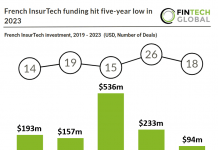Having officially launched earlier this year, new neobank HMBradley has now secured $18.25m in a Series A funding round.
Acrew Capital, which was an early investor in US challenger bank Chime, led the raise.
The challenger bank will use the new cash injection to fuel the growth of its credit programme and continue expanding offerings built around consumer needs.
HMBradley will also invest in talent acquisition, having recently hired Capital One’s former director of engineering Ben Coffman and FinTech thought leader Saira Rahman.
“We started HMBradley with the thesis that people of all income brackets want to save money, but they sometimes need a little help or incentive to do that,” said Zach Bruhnke, co-founder and CEO of HMBradley.
“Every day since our launch, our account holders have proved this to be true. HMBradley’s 3% APY is not a gimmick. We stand behind it because it serves as strong encouragement for customers to practice the financial behaviors that set them up for success.”
The news comes on the back of HMBradley interest rates of up to 3% on savings, to account bearers who save a portion of their deposits each quarter regardless of how much money they earn. The bank has received over $90m in deposits. The average account balance for its accounts stands at almost $30,000.
“We’ve seen many consumer offerings in the challenger bank and consumer finance space, but when we fully understood the HMBradley value proposition to customers, we were really blown away,” said Vishal Lugani, founding partner at Acrew Capital.
“HMBradley really stands out for its laser focus on aligning incentives with its customers. The team has deep fintech experience and its growth, which has been incredibly rapid, is indicative of how well its members (account holders) appreciate the HMBradley offering.”
Copyright © 2020 FinTech Global











